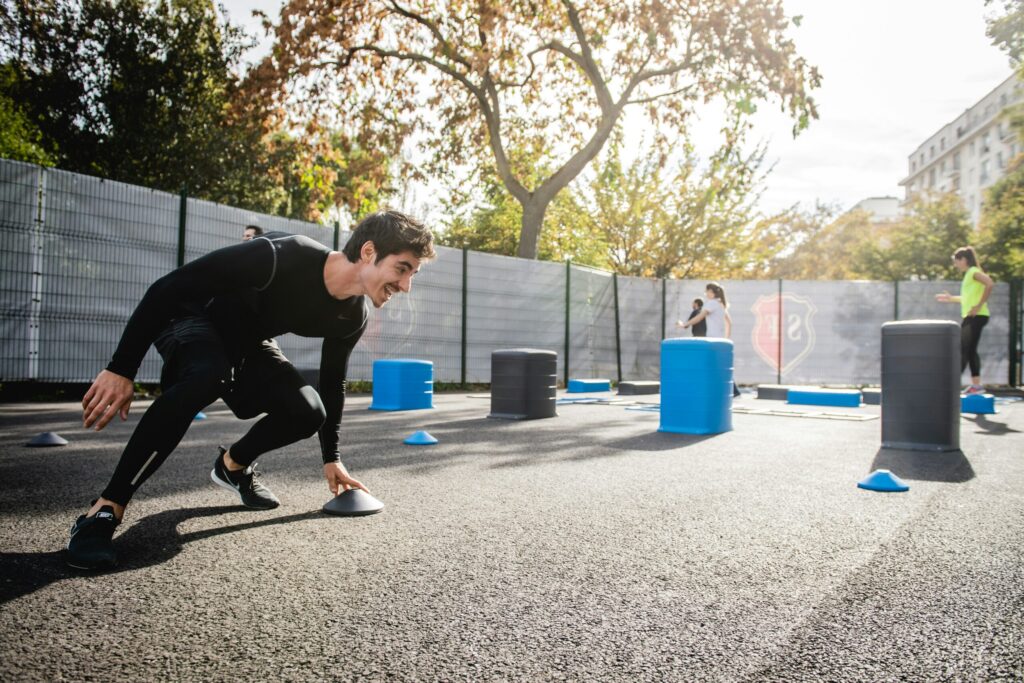Elevate Your Game with Mindfulness Techniques in Sports Training

Elevate Your Game with Mindfulness Techniques in Sports Training
In today’s fast-paced sports world, where athletes are pushed to their physical and mental limits, one might wonder if there’s a secret sauce that could enhance performance. Spoiler alert: it’s not just about the right gear or the latest training regimen. Instead, the key might rest in something as simple—and as complex—as mindfulness. Yes, you heard that right. Mindfulness, often associated with yoga mats and meditation cushions, is finding its way onto the training fields, courts, and tracks across the globe.
What is Mindfulness?
So, let’s break this down. Mindfulness, at its core, is the practice of being present in the moment. It’s about tuning into your thoughts, feelings, and bodily sensations without judgment. Imagine you’re at a critical moment in a game—the crowd is roaring, your heart is racing, and your mind is swirling with thoughts. Now, instead of succumbing to the chaos, you take a deep breath and focus on the task at hand. That’s mindfulness in action.
Why Mindfulness Matters in Sports
Research suggests that athletes who practice mindfulness can improve their focus, reduce anxiety, and enhance their overall performance. A significant number of studies indicate that mindfulness can lead to better decision-making under pressure. It struck me that this is particularly crucial in sports where split-second choices can mean the difference between victory and defeat. Think about a basketball player shooting a free throw or a soccer player taking a penalty kick—nerves can easily get the best of them. Mindfulness can help keep those butterflies in check.
Mindfulness Techniques to Elevate Your Game
Now, you might be asking, “How do I even start?” Good question. Here are some practical mindfulness techniques that athletes—both amateur and professional—can incorporate into their training:
1. Breathing Exercises
One of the simplest yet most effective mindfulness techniques is focusing on your breath. This can be done anywhere, anytime. Before a big game, take a few moments to close your eyes and breathe deeply. Inhale through your nose for a count of four, hold for a count of four, then exhale through your mouth for a count of six. Repeat this for a few minutes. You’ll be surprised—(I nearly forgot to mention this)—how quickly your heart rate can stabilize, and your mind can clear.
2. Visualization
Visualization is a powerful tool that many athletes swear by. Picture this: you’re standing on the starting line, and instead of letting your mind race with anxiety, you visualize yourself completing the race successfully. This technique not only helps with confidence but also prepares your mind and body for the actual event. It’s like a mental dress rehearsal!
3. Body Scan Meditation
The body scan is another technique that encourages awareness of bodily sensations. Find a quiet space, lie down comfortably, and slowly focus your attention on different parts of your body, starting from your toes and moving up to your head. Notice any tension or discomfort and consciously relax those areas. This can help athletes identify and address any physical or mental tension before it escalates.
Real-World Applications
Let’s take a look at how some well-known athletes have integrated mindfulness into their training regimens. Take NBA star LeBron James, for instance. He’s been vocal about the importance of mental health and mindfulness in his career. In interviews, he often mentions how meditation and visualization play crucial roles in his preparation for games. It’s not just about physical conditioning for LeBron; it’s a holistic approach to being the best.
Case Study: The Mindful Runner
Consider the case of a long-distance runner, Sarah, who struggled with anxiety during races. After incorporating mindfulness techniques into her training, she began to see improvements. “I used to feel overwhelmed at the starting line,” she mentioned in a recent podcast. “But once I started focusing on my breath and visualizing my race, I felt more in control.” Sarah’s story is a testament to how mindfulness can help athletes overcome mental barriers and perform at their peak.
The Science Behind Mindfulness and Performance
While anecdotes are powerful, the scientific community is also catching on to the benefits of mindfulness in sports. Research published in the Journal of Sport & Exercise Psychology found that athletes who practiced mindfulness showed significant improvements in their focus and performance. Some studies suggest that regular mindfulness training can even lead to changes in brain structure, enhancing emotional regulation and mental resilience.
Neuroscience: What Happens in Your Brain?
When an athlete practices mindfulness, several areas of the brain are activated, particularly those involved in attention, emotion regulation, and self-awareness. The prefrontal cortex, which helps with decision-making and impulse control, becomes more engaged. This is crucial for athletes who need to make quick decisions under pressure. I remember reading about a study that highlighted how mindfulness can literally change the way your brain functions during high-stakes situations—fascinating stuff!
Mindfulness in Team Sports
Mindfulness isn’t just for solo athletes; it can also be a game-changer for teams. Imagine a soccer team that incorporates mindfulness exercises during practice. Not only does it help individual players, but it also fosters a sense of unity and collective focus. Teams like the Seattle Seahawks have reportedly adopted mindfulness practices to enhance team chemistry and improve overall performance.
Creating a Culture of Mindfulness
For coaches and team leaders, creating a culture of mindfulness can lead to significant benefits. This involves integrating mindfulness practices into training sessions, promoting open discussions about mental health, and encouraging athletes to support each other. It’s about building resilience—not just physically, but mentally, too.
Mindfulness Challenges and How to Overcome Them
Even with all these benefits, it’s important to acknowledge that adopting mindfulness isn’t always smooth sailing. Athletes might struggle with distractions, skepticism, or even the pressure to perform. Here are some common hurdles:
1. Distractions
Let’s face it: in today’s world, distractions are everywhere. Whether it’s the buzz of a phone or the noise of the crowd, it can be tough to maintain focus. One way to combat this is by setting specific times for mindfulness practice. Treat it like training—make it a non-negotiable part of your routine.
2. Skepticism
Some athletes might roll their eyes at the thought of mindfulness, thinking it’s just a fad. (I mean, who hasn’t met that one skeptic?) The key here is to approach it with an open mind. Start with small, manageable practices and see how they feel. You might just find that there’s more to it than you initially thought.
3. Pressure to Perform
When the stakes are high, it’s easy to doubt the effectiveness of mindfulness. Athletes may feel that they don’t have time to meditate or practice breathing exercises. However, integrating mindfulness into daily routines can be done in a few minutes. Even a short five-minute session can make a world of difference.
Mindfulness Beyond the Field
Interestingly, the benefits of mindfulness extend far beyond sports. Many athletes report improvements in their personal lives as well. Mindfulness can help reduce stress, improve relationships, and enhance overall well-being. It’s like finding a hidden gem that not only elevates performance but also enriches life outside of sports.
Life Lessons Learned Through Mindfulness
Athletes often learn valuable life lessons through their mindfulness practices. For instance, the importance of patience, resilience, and the ability to stay present can transcend the playing field. (I can’t help but smile when I think of how many of us could use a little more patience in our daily lives!)
Conclusion: A Holistic Approach to Athletic Success
In the grand scheme of sports training, mindfulness is not just an add-on; it’s an essential component that can elevate performance to new heights. Whether you’re an elite athlete or just starting out, incorporating mindfulness techniques into your training can provide a significant edge. So, the next time you lace up your cleats or step onto the court, remember to breathe, visualize, and embrace the present moment. After all, it’s not just about winning; it’s about enjoying the game and growing as an athlete and as a person.
Now, go ahead and give it a try! You might just discover that the most powerful tool in your athletic arsenal is the one you carry within.







